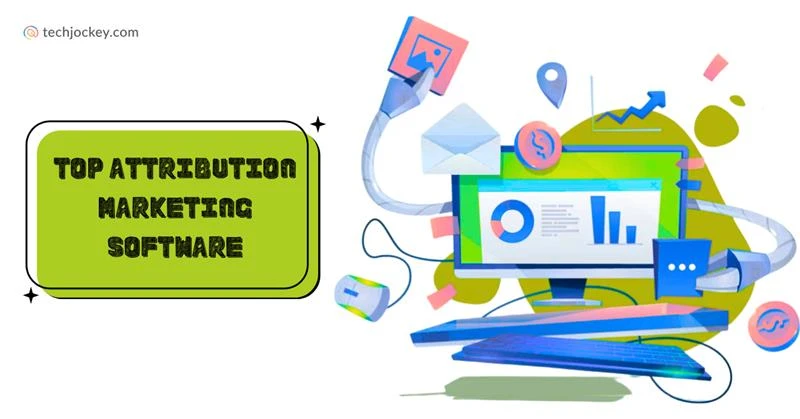Top 7 Attribution Marketing Software in 2026 for Smarter ROI Tracking

Businesses spend loads and loads of cash on campaigns without ever knowing which one made the sale or how many channels played a role in that purchase. That’s like flying blind and wasting resources on stuff that has no contributions to make. This is where attribution marketing software shines.
With its help, marketers can not only navigate where their customers come from, but also identify which touchpoints deserve the credit. So, without wasting any time, let’s get straight into the 7 best attribution marketing software, in order to equip marketers with powerful insights to boost conversions, maximise budgets, and grow revenue.
What is Attribution Marketing Software?
Put simply, attribution marketing software is a specialised marketing tool that keeps track of every marketing touchpoint a prospect comes across before becoming a customer. By assigning value to those interactions, it helps marketers keep tabs on which campaigns, ads, or channels truly influence buying decisions.
It works like a detective, tasked to uncover how many times a customer clicked an ad, visited the website from an email campaign, or interacted with social posts. Instead of accrediting the last click before purchase, it gives you a fuller picture via single-touch or multi-touch attribution models.
These models help allocate budget more wisely, so you don’t waste money on underperforming ads and only spend on channels most effective for conversion.
In addition to that, modern attribution tracking software also respects user data consent regulations, all while helping marketers understand customer behaviour through and through.
Comparison of Top Attribution Marketing Software in 2025
Here’s an in-depth look at the market’s leading B2B attribution software, ensuring you pick the perfect tool to fit your needs…
| Platform | Best For | Integrations |
|---|---|---|
| Usermaven | Startups, SaaS, privacy-focused teams | Google Ads, Meta Ads, Microsoft Ads, LinkedIn Ads, HubSpot, Segment, BigQuery |
| Ruler Analytics | Agencies, marketers tracking ROI | Google Ads, Facebook, Salesforce, HubSpot, Zoho, Microsoft Dynamics, Tableau |
| Adobe AnalyticsLa | Large enterprises | Adobe Experience Cloud, CRM, CDPs, custom integrations |
| Mixpanel | Product teams, UX | Segment, Salesforce, HubSpot, Marketo, Slack, Notion |
| Google Analytics 360 | Large-scale web analytics | Google Ads, Search Ads 360, Campaign Manager 360, CRM systems |
| Dreamdata | B2B marketing teams | HubSpot, Salesforce, ad platforms, custom APIs |
| HubSpot Marketing Hub | Marketing teams, sales alignment | HubSpot, Salesforce, ad platforms, and custom APIs |
Best 7 Attribution Marketing Software in 2026
Here’s a closer look at what makes these attribution tools the best choices for marketers
1. Usermaven
Usermaven is a privacy-first, user-centric marketing attribution software designed to deliver accurate multi-touch attribution insights without sacrificing user privacy. It makes use of a variety of attribution models and AI-powered analytics to help marketers understand their customers’ paths and optimise campaigns.
Key Features of Usermaven:
- Supports seven attribution models: First Touch, Last Touch, Linear, U-Shaped, Time Decay, First Touch Non-Direct, and Last Touch Non-Direct
- Provides AI-powered insights to uncover hidden patterns and predict future performance
- Facilitates customizable conversion goals such as sign-ups, purchases, and downloads
- Offers flexible attribution lookback windows ranging from 30 to 180 days
- Enables real-time dashboards and customizable reports for actionable insights
- Is compliant with GDPR, CCPA, and PECR
- Includes event tracking without coding, funnel analysis, cohort analysis, and customer journey mapping
- Supports integration with major CMS and marketing tools
Pros
- Has an intuitive interface
- Emphasises privacy and ethical data collection with full data ownership
- Offers cost-effective pricing without charging based on page views or events tracked
- Simplifies setup and deployment with lightweight tracking scripts
- Enhances campaign optimisation through detailed multi-touch attribution and predictive analytics
- Includes a free 14-day trial for new users
Cons
- Requires a learning curve for some advanced features and customisations
- Limits dashboard customisation and mobile analytics capabilities
- Provides fewer third-party integrations compared to enterprise-grade platforms
- Lacks built-in A/B testing tools, requiring external solutions
Usermaven Pricing & Plans:
| Plan | Price |
|---|---|
| Pro | $14/month |
| Premium | $49/month |
| Enterprise | Price on request |
2. Ruler Analytics
Ruler Analytics connects marketing, sales, and revenue data with multi-touch and impression attribution models. It tracks offline and online customer touchpoints, linking marketing efforts directly to revenue. Its deep CRM and ad platform integrations make it ideal for marketers who want a clear view of how channels contribute to closing deals.
Key Features of Ruler Analytics:
- Supports multi-touch, first-touch, and last-touch attribution models
- Connects revenue data with CRMs like Salesforce and HubSpot
- Tracks clicks, impressions, and campaign interactions
- Captures offline conversions like phone calls and events
- Provides real-time reports and ROI dashboards
- Integrates with Google Ads, Facebook Ads, HubSpot, and Salesforce
- Delivers full customer journey tracking and predictive insights
Pros
- Links marketing and sales data clearly
- Works well for multi-channel and offline tracking
- Improves budget decisions with revenue attribution
- Aligns sales and marketing with detailed reports
Cons
- Costs more, which may not suit small businesses
- Needs technical setup and CRM integration skills
- Lacks built-in mobile analytics and A/B testing
Ruler Analytics Pricing & Plans:
| Plan | Price |
|---|---|
| Small Business | 179 Euros/month |
| Medium Business | 583 Euros/month |
| Large Business | 999 Euros/month |
| Advanced | Price on request |
3. Adobe Analytics
Adobe Analytics is an enterprise-grade analytics platform offering advanced marketing attribution insights powered by AI and machine learning. It tracks real-time customer journeys across channels and provides deep, customizable reporting and predictive analytics for businesses needing granular and scalable data solutions.

Adobe Analytics
Starting Price
Price on Request
Key Features of Adobe Analytics:
- Uses AI and machine learning for attribution and predictions
- Tracks customer journeys across web, mobile, and other channels
- Provides customizable dashboards and reports
- Integrates with Adobe Experience Cloud and third-party tools
- Offers predictive analytics and anomaly detection
- Supports advanced segmentation and cohort analysis
- Handles cross-device tracking and real-time data processing
- Includes multiple attribution models like linear, first-touch, and last-touch
Pros
- Delivers enterprise-level analytics and attribution
- Allows deep customisation for specific business needs
- Works well with Adobe’s full marketing suite
- Scales easily for large and complex operations
- Enables predictive insights and customer journey mapping
Cons
- Costs are high, making it less ideal for small businesses
- Requires expert users or training to use effectively
- It can be complex to implement and manage
Adobe Analytics Pricing & Plans: Get in touch with the Techjockey product team to get a quote.
4. Mixpanel
Mixpanel offers a unique combination of product analytics and marketing attribution, focusing on user behaviour and engagement. It provides detailed funnel and cohort analysis alongside multi-channel attribution to help marketers understand both the who and how behind conversions and retention.

Mixpanel
Starting Price
Price on Request
Key Features of Mixpanel:
- Supports multi-channel attribution with behavioural analytics
- Tracks funnels, retention, and cohort performance
- Provides user segmentation and journey mapping
- Offers real-time data visualisation and custom reports
- Integrates with ad platforms, CRMs, and analytics tools
- Includes A/B testing, mobile surveys, and event tracking
- Uses point-and-click analytics, no coding needed
Disclaimer: While Mixpanel is best known as a product analytics solution, it also offers attribution features for tracking marketing touchpoints. More product-focused than pure attribution software
Pros
- Combines product usage and marketing attribution
- Works well for SaaS and mobile apps focused on retention
- Delivers intuitive dashboards and flexible reporting
- Offers a free tier for startups and small teams
- Provides deep insights without needing SQL skills
Cons
- Pricing increases with data volume and advanced features
- Focuses more on product analytics than pure marketing attribution
- Has a steep learning curve for non-technical users
| Plan | Price |
|---|---|
| Free | 0 |
| Growth | 1M monthly events are free, and $0.28 per 1K events after |
| Enterprise | Price on request |
5. Google Analytics 4 360
GA4 360 is a premium, enterprise-level attribution marketing software that integrates deeply with Google’s advertising ecosystem. It offers advanced data-driven attribution and segmentation capabilities, powerful funnel and cohort reporting, and SLA-backed support for large organisations with complex data needs.

Google Analytics
Starting Price
Price on Request
Key Features of Google Analytics 4 360:
- Supports data-driven multi-touch attribution models
- Integrates with Google Ads, BigQuery, and Google Cloud
- Provides advanced segmentation and funnel analysis
- Delivers real-time and custom reports with enterprise support
- Offers API access and flexible integrations
- Includes unsampled reports and custom funnels for deeper insights
- Refreshes data every 10 minutes for near real-time tracking
Pros
- Works seamlessly with Google’s marketing tools
- Handles large data volumes with high reliability
- Trusted by global enterprises for accuracy and scale
- Backed by strong documentation and support teams
Cons
- Costs are high
- Requires technical expertise for setup and use
- It may be too complex for small businesses or beginners
Google Analytics 4 360 Pricing & Plans: Get in touch with the Techjockey product team to get a quote.
6. Dreamdata
Dreamdata specialises in B2B revenue attribution, connecting marketing and sales data to track long and complex sales funnels. The platform provides detailed revenue journey analysis and integrates with top CRMs and marketing tools, delivering transparency on how marketing efforts translate into sales.
Key Features of Dreamdata:
- Supports multi-touch attribution for B2B funnels
- Integrates with CRMs like Salesforce, HubSpot, and Marketo
- Provides pipeline and revenue analytics dashboards
- Tracks both online and offline revenue touchpoints
- Offers customer journey mapping and content performance insights
- Activates audiences using AI-driven intent signals
- Feeds pipeline data back to ad platforms for optimisation
Pros
- Focuses on B2B marketing and sales alignment
- Delivers transparent multi-channel revenue attribution
- Integrates easily with popular marketing and sales tools
- Provides clear pipeline analytics for forecasting
- Offers strong customer support and onboarding
Cons
- Not ideal for B2C or simple sales cycles
- Requires some technical skill for full setup and customisation
Dreamdata Pricing & Plans:
| Plan | Price |
|---|---|
| Starter (Plans for smaller teams) | $0/month |
| Activation | Starts from $750/month |
| Advanced (Plans for larger teams) | Price on request |
7. HubSpot Marketing Hub
HubSpot Marketing Hub combines inbound marketing automation with built-in attribution reporting. It allows marketers to track campaigns, understand multi-touch customer journeys, and correlate marketing actions with pipeline revenue.
Integrated tightly with HubSpot CRM, it offers an easy-to-use platform ideal for small to mid-sized businesses aiming to grow.

Hubspot Marketing Hub
Starting Price
$ 20.00
Key Features of HubSpot Marketing Hub:
- Supports multi-touch attribution and campaign ROI tracking
- Connects contact and lifecycle data with HubSpot CRM
- Provides marketing automation and email workflows
- Offers custom dashboards and real-time analytics
- Integrates with Google Ads, Facebook, LinkedIn, and other tools
- Includes AI-powered campaign builder and smart content personalisation
- Tracks behavioural signals like scroll depth and video views
Pros
- Delivers an intuitive, beginner-friendly interface
- Aligns marketing and sales data seamlessly
- Works well for inbound marketing and lead nurturing
- Scales with flexible plans and add-ons
- Offers strong support and free training via HubSpot Academy
Cons
- Limits attribution and reporting in lower-tier plans
- Costs rise quickly with more contacts and features
- Requires onboarding for advanced tiers, which adds to cost
HubSpot Marketing Hub Pricing & Plans:
| Plan | Price |
|---|---|
| Marketing Hub Professional | 66,697 INR/month |
| Marketing Hub Enterprise | 300,000 INR/month |
How to Choose the Best Attribution Marketing Software for Your Business?
Choosing the right attribution marketing software means aligning features, usability, and cost with your business needs…
- Budget: Enterprise platforms like Adobe Analytics and Google Analytics 360 come with hefty price tags. Smaller businesses should consider Usermaven or HubSpot.
- Business Model: B2B businesses benefit from Dreamdata’s specialised revenue attribution, while SaaS/product companies may prefer Mixpanel.
- Privacy: Usermaven is ideal for privacy-conscious marketers with cookie-less tracking.
- Integration: Ruler Analytics and HubSpot provide deep CRM and ad platform integration.
- Ease of Use: HubSpot and Usermaven offer accessible interfaces for teams without deep data skills.
Conclusion
Mastering marketing ROI requires understanding exactly which campaigns and channels work. The right attribution marketing software will help you identify just that by demystifying customer journeys and aligning marketing spend with results.
So, embrace attribution tracking software today and turn your marketing data into your greatest asset!
Yashika Aneja is a Senior Content Writer at Techjockey, with over 5 years of experience in content creation and management. From writing about normal everyday affairs to profound fact-based stories on wide-ranging themes, including environment, technology, education, politics, social media, travel, lifestyle so on and so forth, she... Read more





























